The Motion Picture Associationfilm rating system is used in the United States and its territories to rate a motion picture's suitability for certain audiences based on its content. The system and the ratings applied to individual motion pictures are the responsibility of the Motion Picture Association (MPA), previously known as the Motion Picture Association of America (MPAA) from 1945 to 2019. The MPA rating system is a voluntary scheme that is not enforced by law; films can be exhibited without a rating, although most theaters refuse to exhibit non-rated or NC-17 rated films. Non-members of the MPA may also submit films for rating. Other media, such as television programs, music and video games, are rated by other entities such as the TV Parental Guidelines, the RIAA and the ESRB, respectively.

Showgirls is a 1995 erotic drama film directed by Paul Verhoeven from a script written by Joe Eszterhas and starring Elizabeth Berkley, Kyle MacLachlan, Gina Gershon, Glenn Plummer, Robert Davi, Alan Rachins, and Gina Ravera.

Scary Movie is a 2000 American slasher parody film directed by Keenen Ivory Wayans and written by Marlon and Shawn Wayans, alongside Buddy Johnson, Phil Beauman, Jason Friedberg and Aaron Seltzer. Starring Jon Abrahams, Carmen Electra, Shannon Elizabeth, Anna Faris, Kurt Fuller, Regina Hall, Lochlyn Munro, Cheri Oteri, and Dave Sheridan, it follows a group of teenagers who accidentally hit a man with their car, dump his body in a lake, and swear to secrecy. A year later, someone wearing a Ghostface mask and robe begins hunting them one by one.
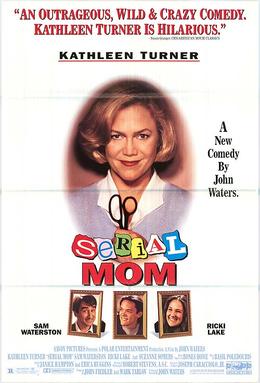
Serial Mom is a 1994 American satirical black comedy crime film directed and written by John Waters and starring Kathleen Turner as the title character along with Sam Waterston as her husband, and Ricki Lake and Matthew Lillard as her children. Patty Hearst, Suzanne Somers, Joan Rivers, Traci Lords, and Brigid Berlin make cameo appearances in the film.

Pink Flamingos is a 1972 American black comedy film by John Waters. It is part of what Waters has labelled the "Trash Trilogy", which also includes Female Trouble (1974) and Desperate Living (1977). The film stars the countercultural drag queen Divine as a criminal living under the name of Babs Johnson, who is proud to be "the filthiest person alive". While living in a trailer with her mother Edie, son Crackers, and companion Cotton, Divine is confronted by the Marbles, a pair of criminals envious of her reputation who try to outdo her in filth. The characters engage in several grotesque, bizarre, and explicitly crude situations, and upon the film's re-release in 1997 it was rated NC-17 by the MPAA "for a wide range of perversions in explicit detail". It was filmed in the vicinity of Baltimore, Maryland, where Waters and most of the cast and crew grew up.
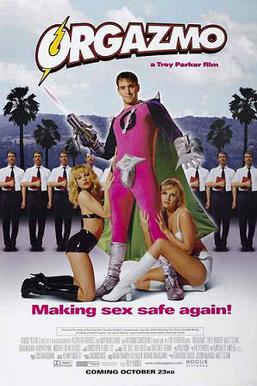
Orgazmo is a 1997 American superhero sex comedy film written, directed and edited by Trey Parker and produced by Matt Stone, Jason McHugh, and Fran Rubel Kuzui. It stars Parker, Stone, Dian Bachar, Robyn Lynne, and Michael Dean Jacobs. The plot follows Joe Young, a devout Mormon missionary who, to pay for his and his fiancée's dream wedding and home, acts in a pornographic film as the superhero Orgazmo with his side-kick Chota boy.

The Dreamers is a 2003 romantic drama film directed by Bernardo Bertolucci. The screenplay is by Gilbert Adair, based on his 1988 novel The Holy Innocents. An international co-production by companies from France, the United Kingdom, and Italy, the film tells the story of an American university student in Paris who, after meeting a peculiar brother and sister who are fellow film enthusiasts, becomes entangled in an erotic triangle. It is set against the backdrop of the 1968 Paris student riots. The film makes several references to various movies of classical and French New Wave cinema, incorporating clips from films that are often imitated by the actors in particular scenes.

John Samuel Waters Jr. is an American filmmaker, writer, actor, and artist. He rose to fame in the early 1970s for his transgressive cult films, including Multiple Maniacs (1970), Pink Flamingos (1972) and Female Trouble (1974). Waters wrote and directed the comedy film Hairspray (1988), which was later adapted into a hit Broadway musical and a 2007 musical film. Other films he has written and directed include Desperate Living (1977), Polyester (1981), Cry-Baby (1990), Serial Mom (1994), Pecker (1998), and Cecil B. Demented (2000). His films contain elements of post-modern comedy and surrealism.
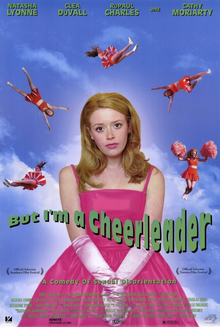
But I'm a Cheerleader is a 1999 American satirical teen romantic comedy film directed by Jamie Babbit in her feature directorial debut and written by Brian Wayne Peterson. Natasha Lyonne stars as Megan Bloomfield, a high school cheerleader whose parents send her to a residential in-patient conversion therapy camp to "cure" her lesbianism. At camp, Megan realizes that she is indeed a lesbian and, despite the "therapy", comes to embrace her sexuality. The supporting cast includes Clea DuVall, RuPaul, and Cathy Moriarty.
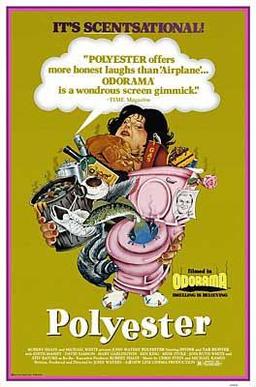
Polyester is a 1981 American comedy film directed, produced, and written by John Waters, and starring Divine, Tab Hunter, Edith Massey, and Mink Stole. It satirizes the melodramatic genre of women's pictures, particularly those directed by Douglas Sirk, whose work directly influenced this film. The film is also a satire of suburban life in the early 1980s, involving topics like divorce, abortion, adultery, alcoholism, racial stereotypes, foot fetishism, and the religious right.
Mary Vivian Pearce is an American actress. She has worked primarily in the films of John Waters.
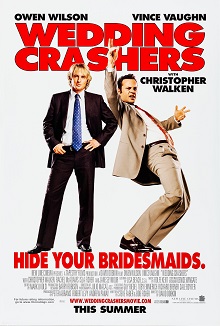
Wedding Crashers is a 2005 American romantic comedy film directed by David Dobkin, written by Steve Faber and Bob Fisher, starring Owen Wilson, Vince Vaughn and Christopher Walken with Rachel McAdams, Isla Fisher, Bradley Cooper and Jane Seymour in supporting roles. The film follows two divorce mediators who crash weddings in an attempt to meet and seduce women.
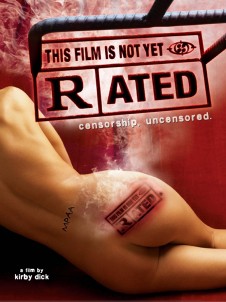
This Film Is Not Yet Rated is a 2006 American documentary film about the Motion Picture Association of America's rating system and its effect on American culture, directed by Kirby Dick and produced by Eddie Schmidt. It premiered at the 2006 Sundance Film Festival and received a limited theatrical release on September 1, 2006. IFC, the film's distributor, aired the film later that year.

Tarzoon: Shame of the Jungle is a 1975 French/Belgian adult animated comedy film. It is a parody of the 1932 film Tarzan the Ape Man directed by cartoonist Picha and Boris Szulzinger. The film was the first foreign-animated film to receive an X rating in the United States.

My Bloody Valentine is a 1981 Canadian slasher film directed by George Mihalka and written by John Beaird. It stars Paul Kelman, Lori Hallier, and Neil Affleck. The plot tells about a group of young adults who decide to throw a Valentine's Day party, only to incur the vengeful wrath of a maniac in mining gear who begins a killing spree.

Lust, Caution is a 2007 erotic period espionage romantic mystery film directed by Ang Lee, based on the 1979 novella of the same name by Eileen Chang. Lust, Caution is set in Hong Kong in 1938 and in Shanghai in 1942, when the city was occupied by the Imperial Japanese Army and ruled by the puppet government led by Wang Jingwei. The film depicts a group of Chinese university students from The University of Hong Kong who plot to assassinate a high-ranking special agent and recruiter working for the puppet government by luring him into a honey trap. The film is generally accepted to be based on the historical event of Chinese spy Zheng Pingru's failed attempt to assassinate the Japanese collaborator Ding Mocun.

Ma Mère is a 2004 erotic drama film written and directed by Christophe Honoré, based on the posthumous 1966 novel of the same name by French author Georges Bataille. The film follows the incestuous relationship between a 17-year-old boy and his attractive, promiscuous, 43-year-old mother. The film stars Isabelle Huppert, Louis Garrel, Emma de Caunes and Joana Preiss.

Shame is a 2011 British erotic psychological drama film, set in New York, directed by Steve McQueen, co-written by McQueen and Abi Morgan, and starring Michael Fassbender and Carey Mulligan as grown siblings. It was co-produced by Film4 and See-Saw Films. The film's explicit scenes reflecting the protagonist's sexual addiction resulted in a rating of NC-17 in the United States. Shame was released in the United Kingdom on 13 January 2012. It received generally positive reviews, with praise for Fassbender's and Mulligan's performances, realistic depiction of sexual addiction, and direction.
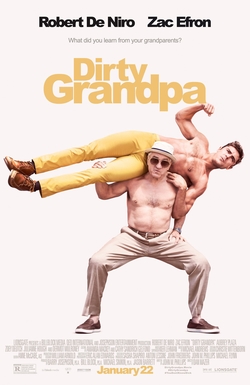
Dirty Grandpa is a 2016 American buddy sports romantic sex comedy film about a lawyer who drives his grandfather to Florida during spring break. The film was directed by Dan Mazer and written by John Phillips. It stars Robert De Niro and Zac Efron in the leading roles, with Aubrey Plaza, Zoey Deutch, Julianne Hough and Dermot Mulroney in supporting roles. It was filmed on location in Atlanta from January 19 to May 9, 2015.

















